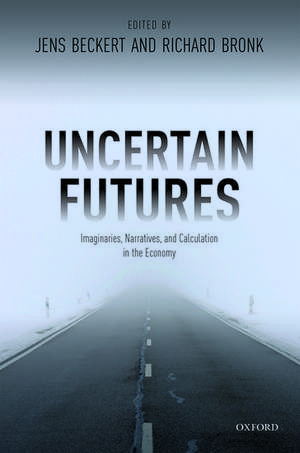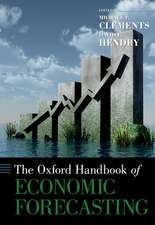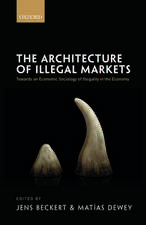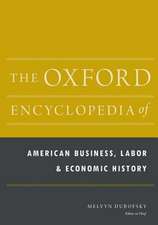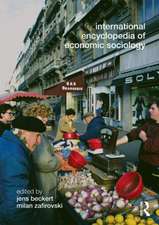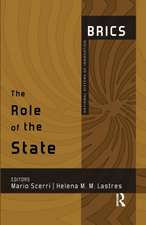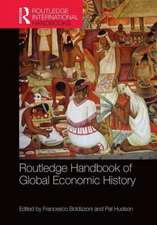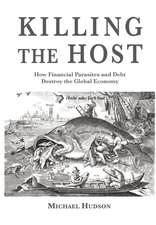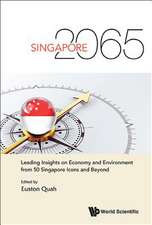Uncertain Futures: Imaginaries, Narratives, and Calculation in the Economy
Editat de Jens Beckert, Richard Bronken Limba Engleză Hardback – aug 2018
| Toate formatele și edițiile | Preț | Express |
|---|---|---|
| Paperback (1) | 248.86 lei 31-38 zile | |
| OUP OXFORD – 9 sep 2019 | 248.86 lei 31-38 zile | |
| Hardback (1) | 578.73 lei 10-17 zile | |
| OUP OXFORD – aug 2018 | 578.73 lei 10-17 zile |
Preț: 578.73 lei
Preț vechi: 682.68 lei
-15% Nou
Puncte Express: 868
Preț estimativ în valută:
110.74€ • 115.62$ • 91.65£
110.74€ • 115.62$ • 91.65£
Carte disponibilă
Livrare economică 03-10 martie
Preluare comenzi: 021 569.72.76
Specificații
ISBN-13: 9780198820802
ISBN-10: 0198820801
Pagini: 346
Dimensiuni: 163 x 242 x 26 mm
Greutate: 0.73 kg
Editura: OUP OXFORD
Colecția OUP Oxford
Locul publicării:Oxford, United Kingdom
ISBN-10: 0198820801
Pagini: 346
Dimensiuni: 163 x 242 x 26 mm
Greutate: 0.73 kg
Editura: OUP OXFORD
Colecția OUP Oxford
Locul publicării:Oxford, United Kingdom
Recenzii
By making the reader enter the complex worlds of uncertainty management in the economy, Uncertain Futures demonstrates the richness of the contemporary field of research about "futures" in the social sciences....This book offers great insights for any socialscientist interested in future management and social action.
An edited volume is usually less than the sum of its parts. It is the other way round in the case of the volume edited by Jens Beckert and Richard Bronk. The intellectual heavyweight of an introduction frames the other, conceptual and empirical, chapters. It gives the reader an elaborate language for describing the phenomena that constitute uncertain futures and distils what the chapters find out about the ways agents deal with fundamental uncertainty . . . The real point about uncertain futures is that what generates uncertainty is not "out there" but generated inside the system to which it refers.
Collectively, the essential introduction and the selected chapters form a powerful and well-developed contribution to current knowledge about the economy in the social sciences. Indeed, what is most striking in this volume is that it successfully offers 'an unashamedly interdisciplinary' (ix) outlook towards economic action under conditions of uncertainty, bringing together several disciplines, from sociology, political economy and anthropology, to social psychology and economics... Whatever the uncertain future may hold for it, Beckert's and Bronk's Uncertain Futures is highly recommended for a wide range of readers, being able to speak to economic sociologists, anthropologists, political economists, psychologists and, why not, economists, too.
Uncertain Futures is a thought-provoking and analytically helpful book. It corrects some established assumptions in economics and sociology and proposes directions for further research in such important fields as decision-making under uncertainty, economic microfoundations and sociology of expectations.
Uncertain Futures is a stimulating and diverse collection of papers about the consequences of radical uncertainty and how they are managed in practice. As the clear and comprehensive introduction by the editors explains, devices such as narratives, stories, conversations and 'imaginaries' give shape to expectations of the future. .. . Radical uncertainty is not a new concept, but it nevertheless receives less attention than it really deserves. Uncertain Futures is a very welcome and interesting antidote. It left this reader with an enhanced understanding of the expedients that are customarily used as means of either overcoming or else tacitly ignoring radical uncertainty, and of the dangers that a flawed but superficially persuasive narrative can wreak. Mindless positivity is just as dangerous as mindless negativity. For that alone, Uncertain Futures is well worth reading.
Economic theory is built on how people make decisions, and in real life all decisions are made under some degree of fundamental uncertainty - people simply do not know what future they face. Uncertain Futures shows that people use works of imagination, or they use narratives, or calculative practices such as business plans, to act in spite of uncertainty. Economics - thanks to Beckert and Bronk - can build upon a much more realistic human foundation than before. A first-rate contribution to the field.
Especially when uncertainties produced by innovation are compounded by second-order uncertainties about the reactions of others, what should one do when rational calculation of probabilities based on past data is ineffective in predicting the future? From a diverse range of disciplinary perspectives, the essays in this collection creatively explore the role of imagination - long studied as a source of innovation, but until now neglected as a response to uncertainty.
We all have to take decisions with long-term consequences, with little knowledge of what the future may bring. The future is inherently uncertain, so we cannot even estimate probabilities in most cases. The editors of this book have put together a collection of papers by economic sociologists, economists, a psychologist, and an anthropologist to explore the various calculative techniques, narratives, and imaginaries that we use in practice. It is all a far cry from the precise mathematical techniques of the rational expectation world of mainstream DSGE modelling, but none the worse for that.
How do people make sense of the unknown - perhaps unknowable - future? It is becoming increasingly clear that this question is central to our understanding of economic life. The fine collection of studies in this book is a crucial contribution to this vital debate.
I commend this perspective to economists. This is exciting intellectual territory and seems to me rather important at a time when the future seems more uncertain than ever.
"Questions about how best to characterise the practical grounds of economic agency and the epistemic tools for interpreting it, remain absolutely wide open. They are posed throughout Uncertain Futures in a variety of interesting forms, making this edited volume by Jens Beckert and Richard Bronk an important contribution to current debates on these fundamental economic issues that deserves to be widely read and constructively criticised." - Samuel Sadian, University of Barcelona
An edited volume is usually less than the sum of its parts. It is the other way round in the case of the volume edited by Jens Beckert and Richard Bronk. The intellectual heavyweight of an introduction frames the other, conceptual and empirical, chapters. It gives the reader an elaborate language for describing the phenomena that constitute uncertain futures and distils what the chapters find out about the ways agents deal with fundamental uncertainty . . . The real point about uncertain futures is that what generates uncertainty is not "out there" but generated inside the system to which it refers.
Collectively, the essential introduction and the selected chapters form a powerful and well-developed contribution to current knowledge about the economy in the social sciences. Indeed, what is most striking in this volume is that it successfully offers 'an unashamedly interdisciplinary' (ix) outlook towards economic action under conditions of uncertainty, bringing together several disciplines, from sociology, political economy and anthropology, to social psychology and economics... Whatever the uncertain future may hold for it, Beckert's and Bronk's Uncertain Futures is highly recommended for a wide range of readers, being able to speak to economic sociologists, anthropologists, political economists, psychologists and, why not, economists, too.
Uncertain Futures is a thought-provoking and analytically helpful book. It corrects some established assumptions in economics and sociology and proposes directions for further research in such important fields as decision-making under uncertainty, economic microfoundations and sociology of expectations.
Uncertain Futures is a stimulating and diverse collection of papers about the consequences of radical uncertainty and how they are managed in practice. As the clear and comprehensive introduction by the editors explains, devices such as narratives, stories, conversations and 'imaginaries' give shape to expectations of the future. .. . Radical uncertainty is not a new concept, but it nevertheless receives less attention than it really deserves. Uncertain Futures is a very welcome and interesting antidote. It left this reader with an enhanced understanding of the expedients that are customarily used as means of either overcoming or else tacitly ignoring radical uncertainty, and of the dangers that a flawed but superficially persuasive narrative can wreak. Mindless positivity is just as dangerous as mindless negativity. For that alone, Uncertain Futures is well worth reading.
Economic theory is built on how people make decisions, and in real life all decisions are made under some degree of fundamental uncertainty - people simply do not know what future they face. Uncertain Futures shows that people use works of imagination, or they use narratives, or calculative practices such as business plans, to act in spite of uncertainty. Economics - thanks to Beckert and Bronk - can build upon a much more realistic human foundation than before. A first-rate contribution to the field.
Especially when uncertainties produced by innovation are compounded by second-order uncertainties about the reactions of others, what should one do when rational calculation of probabilities based on past data is ineffective in predicting the future? From a diverse range of disciplinary perspectives, the essays in this collection creatively explore the role of imagination - long studied as a source of innovation, but until now neglected as a response to uncertainty.
We all have to take decisions with long-term consequences, with little knowledge of what the future may bring. The future is inherently uncertain, so we cannot even estimate probabilities in most cases. The editors of this book have put together a collection of papers by economic sociologists, economists, a psychologist, and an anthropologist to explore the various calculative techniques, narratives, and imaginaries that we use in practice. It is all a far cry from the precise mathematical techniques of the rational expectation world of mainstream DSGE modelling, but none the worse for that.
How do people make sense of the unknown - perhaps unknowable - future? It is becoming increasingly clear that this question is central to our understanding of economic life. The fine collection of studies in this book is a crucial contribution to this vital debate.
I commend this perspective to economists. This is exciting intellectual territory and seems to me rather important at a time when the future seems more uncertain than ever.
"Questions about how best to characterise the practical grounds of economic agency and the epistemic tools for interpreting it, remain absolutely wide open. They are posed throughout Uncertain Futures in a variety of interesting forms, making this edited volume by Jens Beckert and Richard Bronk an important contribution to current debates on these fundamental economic issues that deserves to be widely read and constructively criticised." - Samuel Sadian, University of Barcelona
Notă biografică
Jens Beckert is director of the Max Planck Institute for the Study of Societies in Cologne. In 2018 he was awarded the Gottfried Wilhelm Leibniz Prize for his work reinvigorating the social sciences with an interdisciplinary perspective, especially at the intersection of sociology and economics. His research focuses on the fields of economic sociology, sociology of inheritance, organization theory, and social theory.Richard Bronk is a Visiting Senior Fellow in the European Institute at the London School of Economics and Political Science. He spent seventeen years working in the City of London and the Bank of England before teaching political economy at LSE from 2000-2007. His research now focuses on the role of imagination and language in economics, the dangers of analytical and regulatory monocultures, and the epistemology of markets.
